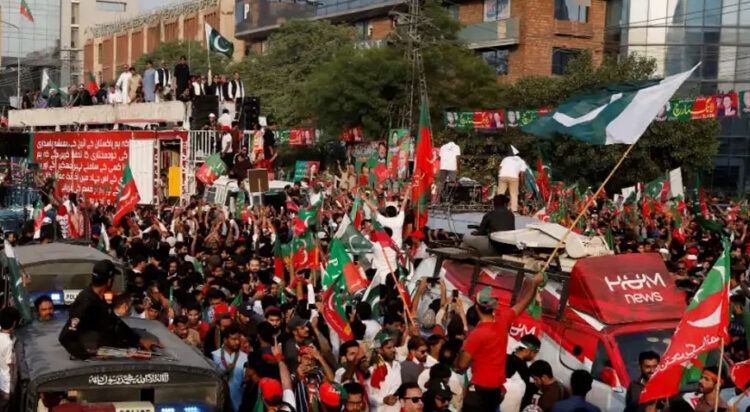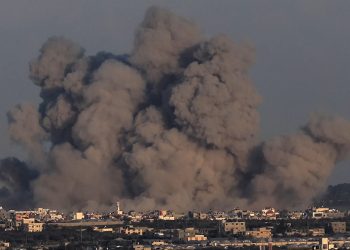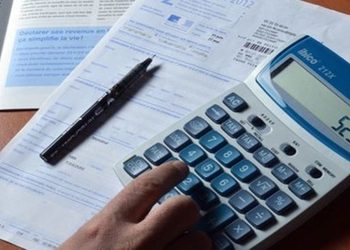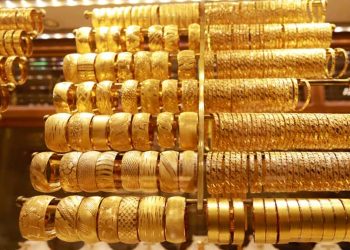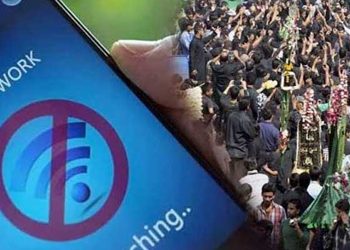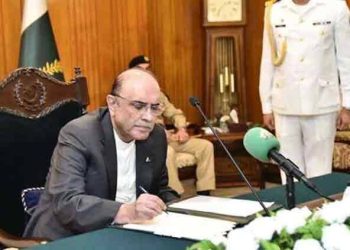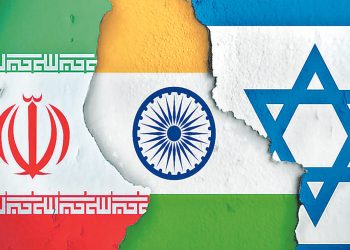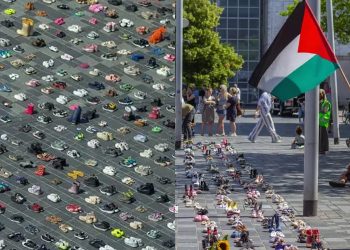In a rapidly intensifying political showdown, over 1,500 supporters of Pakistan Tehreek-e-Insaf (PTI) have been arrested across Islamabad, Rawalpindi, and other regions in the past 24 hours, as the party mobilized a series of protests demanding the release of its incarcerated leader, Imran Khan.
The protests, led by Bushra Bibi, wife of Imran Khan, and Khyber Pakhtunkhwa (KP) Chief Minister Ali Amin Gandapur, have triggered a large-scale security operation across the federal capital and surrounding areas.
The PTI convoy, which set off from Peshawar on Sunday, reached Dhoke Ghar near Burhan by early Monday morning and is now making its way towards Islamabad despite widespread roadblocks and a heavy police presence. The rally is expected to continue its journey towards the capital in a bid to pressure the government into releasing Imran Khan.
In response to the PTI protests, the authorities have deployed 6,000 police personnel across various entry points into Islamabad, with an additional 2,000 officers on standby. This move is aimed at preventing PTI supporters from entering the capital, where tensions are already running high. The government has enforced Section 144, a law that prohibits large gatherings and has closed key roads, including the Srinagar Highway and the Expressway at Khanna Bridge. Surveillance has also been heightened across the city with 70 locations monitored via CCTV cameras.
Protests and Clashes Erupt Across Key Locations
As PTI supporters have gathered in different parts of Islamabad and Rawalpindi, clashes have erupted at Faizabad, where protesters threw stones at the police. The authorities used batons to disperse the crowds, resulting in the arrest of 25 PTI workers, including former National Assembly member Sadaqat Abbasi. Additional arrests have been made across various locations, including Rawalpindi’s IJP Road, where around 60 PTI activists were detained during a crackdown.
In a more extreme development, PTI supporters from Khyber Pakhtunkhwa claimed that armed individuals set fire to heavy machinery on the way to Swabi, machinery intended to dismantle the roadblocks impeding the movement of the convoys. The provincial government has raised concerns that these actions could derail their efforts to maintain a peaceful protest.
Intensifying Security Measures and Impact on Daily Life
To contain the growing unrest, police have erected barriers to shipping containers at strategic locations, including D-Chowk and Serena Chowk, while multiple key roads in Islamabad have been sealed off. In Rawalpindi, police have blocked the Murree Road at multiple points, and checkpoints have been set up on highways leading to the capital. Security forces are also monitoring any attempts to bring in PTI activists from other provinces, including Punjab, where roadblocks are causing severe traffic disruptions.
The security crackdown has not only disrupted the movement of PTI convoys but has also caused significant disturbances to daily life. Public transport services, including the Rawalpindi-Islamabad Metro Bus, have been suspended indefinitely. Metro bus services in Lahore have been limited, and several educational institutions in the twin cities have been closed due to security concerns.
Bushra Bibi’s Message
Bushra Bibi, speaking to the media, emphasized the importance of the protests as a demonstration of loyalty to the party and its leadership. She warned party members that their long-term political success would be at risk if they failed to meet the party’s expectations during these protests. According to Bibi, the demonstration is primarily aimed at securing the release of Imran Khan, who is currently imprisoned on charges related to corruption and contempt of court.
The PTI leadership has outlined four specific demands for ending the protests, but Bibi indicated that the date for ending the protests would only change if Imran Khan is released from jail. She reiterated that this protest is a critical test of PTI’s strength and unity.
Government’s Stance and Further Crackdowns
Defence Minister Khawaja Asif has labeled the PTI’s actions as an “insurrection,” suggesting that the party is attempting to seize control of the capital through protests. The government has accused PTI of attempting to incite unrest, intending to destabilize the political system. The Islamabad High Court had ruled earlier in the week that no protests or rallies violating public gathering laws would be allowed, citing the need to maintain order during the visit of the Belarusian president.
Despite the court order and roadblocks, PTI convoys continued to march towards Islamabad, believing that their grievances have not been adequately addressed. The federal government has called in additional troops to maintain order, and security forces are on high alert to prevent any breaches of peace. The security measures have been extended to surrounding cities, with reports indicating widespread road closures and security checks on the highways leading into the capital.
Crackdown Continues Across the Country
The police crackdown on PTI supporters has been extensive, with significant arrests reported not only in Islamabad but also in Rawalpindi, Punjab, and Khyber Pakhtunkhwa. Over 490 PTI workers have been arrested across Punjab alone, with many others remaining unaccounted for. In addition, authorities have implemented internet restrictions in areas deemed to be hotspots for protest activity. Local news outlets have reported that communication networks have been intermittently blocked in several regions, further heightening tensions.
With protests and clashes continuing, the PTI has accused the government of using excessive force to stifle dissent and suppress political expression. Meanwhile, the federal administration has stated that any attempts to disturb public order will be met with force and those responsible will face legal action under Section 144.
The situation remains fluid, and further developments are expected as both sides brace for continued confrontation. The political standoff shows no signs of abating, with PTI vowing to keep up the pressure on the government until their demands are met. The capital and surrounding regions are under a heightened state of alert as the protests unfold.







